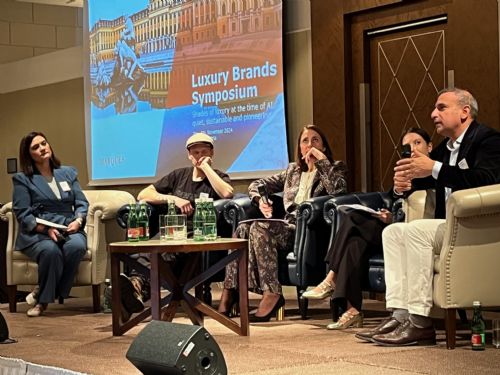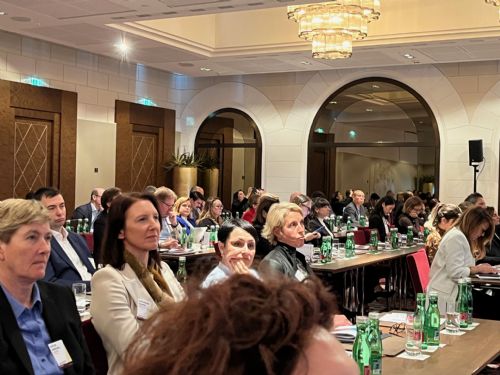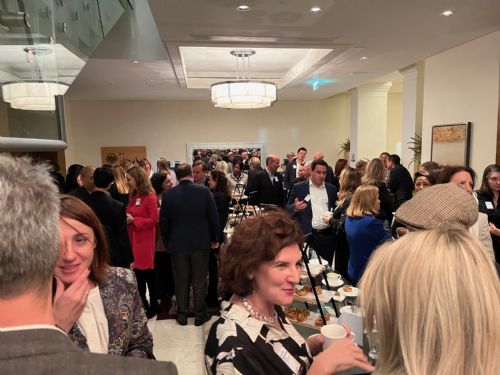Now in its twelfth year, Class 46 is dedicated to European trade mark law and practice. This weblog is written by a team of enthusiasts who want to spread the word and share their thoughts with others.
Click here subscribe for free.
Who we all are...
Luxury Brands Symposium 2024 - Day 1
 The MARQUES Luxury Brands Symposium is taking place in Vienna this week. The first day focused on artificial intelligence (AI) and sustainability.
The MARQUES Luxury Brands Symposium is taking place in Vienna this week. The first day focused on artificial intelligence (AI) and sustainability.
In the morning, a panel discussed recent developments in AI and how they might impact the luxury goods industry. In the first presentation, Katie Warner, Field Fisher, UK said AI has the potential to revolutionise creative processes and content generation.
She discussed how AI raises concerns about data and privacy, misrepresentations, employment, ethics and IP. While the UK has taken a generally hands-off approach to regulation, the EU has been more active with the passing of the EU AI Act.
In terms of IP rights, there are different risks associated with inputs and outputs of AI systems. One question is on the copyrightability of AI-generated works, and this remains open. “Different courts have come to different conclusions,” she said.
Katie is acting for Getty Images in its litigation against Stability AI concerning the latter’s text-to-image generative AI model. The litigation in the UK courts includes claims for copyright, database right and trade mark infringement and passing off. Trial is set for June 2025. “The UK courts have not had an opportunity to consider the application of IP to generative AI, so the outcome will be very important for the industry,” she said.
Creativity is at the heart of luxury sectors, said Dr Valentina Moscon, Max Planck Institute for Innovation and Competition, Senior Research Fellow, Intellectual Property and Competition Law, Germany. In Europe, there is a low threshold for originality for copyright and a broad scope of protection.
Generative AI presents both an opportunity and a challenge for luxury brands, she said, in terms of training and products. “Generative AI is capable of creating outputs that are identical the original input,” she said. This generates questions including: could similarities be regarded as copyright infringement? If so, who is liable? And is there any exception or limitation?
“We don’t know how the technology will develop but we are risking massive copyright infringement,” she said. But she added that we should not overlook the benefits of AI, which are highlighted in the recent Draghi report. Issues being discussed include a specific liability regime in relation to copyright infringement in the context of generative AI, exemptions from liability and an output-based lump-sum remuneration system.
Agnis Leznins, Chillhop Music, The Netherlands, discussed AI and the music industry. The music industry is expected to be worth €45 billion by 2029 with 100,000 new songs uploaded every day just to Spotify. Agnis played three snippets of songs and showed four images for the audience to guess which were AI-generated. (All of them were.)
AI is having an impact on every aspect of the music industry, he said, from drafting agreements to mixing/mastering and even music generation. This leads to loss of revenue and work opportunities, an unimaginable quantity of digital content, greater stress on the energy sector, cultural and societal shifts and other disruption.
He concluded by asking: what is the value of AI art? How do we educate people about AI and technology? How will creatives earn a living in a world where they have been replaced by computers? And what do we do when AI becomes sentient?
 Bharat Kapoor, Vice President – Authentix – Online Brand Protection, USA, said Goldman Sachs expects investments in AI to reach $200 billion in 2025. Forbes predicts that AI will contribute $15.7 trillion to the global economy by 2030.
Bharat Kapoor, Vice President – Authentix – Online Brand Protection, USA, said Goldman Sachs expects investments in AI to reach $200 billion in 2025. Forbes predicts that AI will contribute $15.7 trillion to the global economy by 2030.
Bharat examined how AI will impact the luxury industry in various ways, including the use of AI agents. “It’s going to change consumer behaviour,” he said, using examples from popular generative AI tools. “We need to develop some moderation tools around AI.”
Finally, he looked at what actions can be taken against rogue AI sites which promote counterfeits and other illegal activity.
The session was chaired by Carolina Montero, ECIJA, Spain. During an extended Q&A, the panel and audience discussed topics including brand protection, designs, anticounterfeiting, sustainability and ethics.
Greenwashing
Sustainability was covered further after lunch. “Consumers expect to get sustainable products and services and investors and business partners also want sustainability,” said Michael Noth, TIMES Attorneys, Switzerland, Chair of the MARQUES Famous & Well Known Marks Team, who chaired the session. “Sustainability makes you more competitive and can strengthen your brand.”
He highlighted recent legislation under the European Green Deal, including the EU Taxonomy Regulation, Corporate Sustainability Reporting Directive and Sustainable Financial Disclosure Regulation. New/upcoming legislation includes the Directive on consumer empowerment for the green transition, the EU Green Claims Directive, unfair competition law, soft law and codes of professional associations.
Michael stressed the importance of making statements that you can prove and asked: are luxury goods by nature sustainable? After all, they are designed to be long-lasting, are passed on to future generations, are produced in limited quantities and produced to high standards with well-sourced materials.
Dr Stefan Ottrubay, President of the Supervisory Board of the Esterhazy Company, Austria, traced the origins of the Esterhazy Foundation back to the 16th century. The Foundation has about 50 trade marks in various fields. “By definition we are extremely green,” he said. “All our agricultural activities for 20 years have been totally organic.”
Danae Motta, Robeco Switzerland Ltd, provided a perspective from the investment industry. “The term sustainability is a little bit grey,” she said. This has led to questionable claims, and there are limited resources available to scrutinise them. She said that the SFDR, CSRD and the EU Taxonomy will help to regulate this area.
But she said there is a lack of guidance, in particular regarding social sustainability (the S in ESG). Robeco therefore launched the Fashion Engagement strategy, focusing on five areas: decent work, natural resource stewardship, circular business models, stakeholder management and governance and policies.
In the past year, Robeco has held meetings with all its luxury holdings and some suppliers. “Long-term investments are necessary to support the transition,” she said. Learnings include that traceability and due diligence are among top priorities of sustainability teams, and that challenges remain due to supply chain complexity, data availability, supplier education and limited guidelines.
“Change is slow and comes from many different places,” she said, but there are several things that companies can do to start, including auditing supply chains, checking on health and safety and promoting living wages. She also stressed that collaboration is key and that greenwashing issues will continue to arise due to the complexity of supply chains. “Instead of shaming companies, I want to highlight those that are willing to act,” she said.
 Michael Regner, Hotel Industry Expert, Founder and shareholder of several Hotel Industry Platforms (MRP hotels (advisory), ECHO Partners AG (Hotel Investment Fund), LOISIUM Hotels, Xenios Hospitality Holding), Austria, spoke about understanding the global green transformation.
Michael Regner, Hotel Industry Expert, Founder and shareholder of several Hotel Industry Platforms (MRP hotels (advisory), ECHO Partners AG (Hotel Investment Fund), LOISIUM Hotels, Xenios Hospitality Holding), Austria, spoke about understanding the global green transformation.
He highlighted that consumers often seek token examples of sustainability – such as paper straws – while overlooking much bigger problems such as food waste, water usage and private flights. “Customers want greenwashing,” he observed, and added: “Luxury travel is not sustainable.”
But there are things companies can do to promote sustainability, such as reducing their infrastructure footprint, being embedded in the local region, promoting earthbound travel and using local suppliers and regional products.
Finally, Christoph Köchert, A.E. Köchert, Austrian “Imperial Royal Court Jeweller”, Austria said that family-run firms promote responsible relationships and social engagement. In the jewellery industry, two big issues are gold mining and gemstones. But, despite efforts to promote sustainability, Christoph said there is still a risk that the approach is “too superficial”.
“We need to delve deeper into supply chains especially for luxury brands which promise perfection,” said Christoph. He concluded that “there is no more sustainable investment than jewellery” as it is fully recyclable and upcyclable and will retain and even increase value.
Posted by: Blog Administrator @ 17.35Tags: luxury brands, Vienna, ,


 Sharing on Social Media? Use the link below...
Sharing on Social Media? Use the link below...Perm-A-Link: https://www.marques.org/blogs/class46?XID=BHA5310

